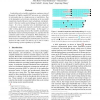Free Online Productivity Tools
i2Speak
i2Symbol
i2OCR
iTex2Img
iWeb2Print
iWeb2Shot
i2Type
iPdf2Split
iPdf2Merge
i2Bopomofo
i2Arabic
i2Style
i2Image
i2PDF
iLatex2Rtf
Sci2ools
580
click to vote
SC
2015
ACM
2015
ACM
BAD-check: bulk asynchronous distributed checkpointing
Leadership-scale scientific simulations running as tens of thousands of tightly-coupled MPI processes are vulnerable to interruption due to a single process or node failure. Due to the dependence of each state calculation on the successful completion of each of the prior state calculations, checkpointrestart is the most widely-used technique to achieve fault tolerance. To write a consistent view of distributed state as a checkpoint, applications typically synchronize and pause while writing data to persistent media. In this paper we present a transactional protocol that enables asynchronous distributed creation of checkpoint data sets, and describe the conditions under which it is beneficial. With simulations, we demonstrate that scientific applications exhibiting computational variance without frequent synchronization can use our protocol to either reduce run time by up to 27% or reduce required storage system capability by up to 40%.
| Added | 17 Apr 2016 |
| Updated | 17 Apr 2016 |
| Type | Journal |
| Year | 2015 |
| Where | SC |
| Authors | John Bent, Brad Settlemyer, Haiyun Bao, Sorin Faibish, Jeremy Sauer, Jingwang Zhang |
Comments (0)

